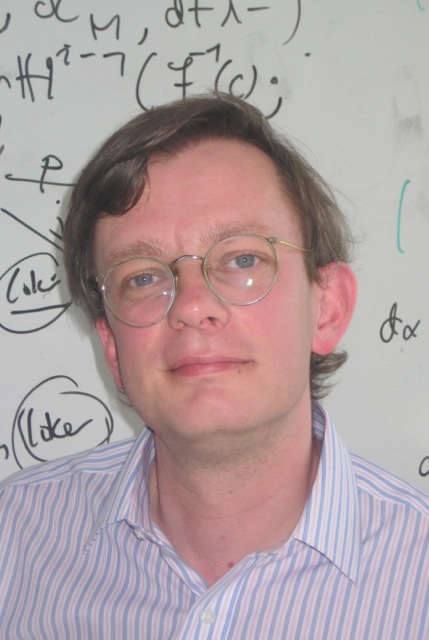
Dominic Joyce went to Oxford University as an undergraduate in 1986, and has never got around to leaving. He got his BA in 1989, his DPhil in 1992, was a Junior Research Fellow 1992-1995, a University Lecturer and Tutorial Fellow 1995-2006, an EPSRC Advanced Fellow 2001-2006, and a Professor of Mathematics 2006 – present. He is Co-Investigator in a domestic research group currently consisting of his wife, three daughters, and a hamster (the PI). He received the LMS Junior Whitehead Prize in 1997, an EMS prize for young mathematicians in 2000, the Cambridge University Adams Prize in 2004, was elected a Fellow of the Royal Society in 2012, and was awarded the LMS Fröhlich Prize in 2016.
Joyce’s research spans a broad range of areas in Differential and Algebraic Geometry. These include the exceptional Riemannian holonomy groups ![]() and Spin(7), for which he constructed the first known examples of compact 7- and 8-manifolds with these holonomy groups in 1994-5, calibrated submanifolds and their singularities, in particular special Lagrangian submanifolds in Calabi-Yau manifolds, Lagrangian Mean Curvature Flow, and Lagrangian Floer theory in Symplectic Geometry.
and Spin(7), for which he constructed the first known examples of compact 7- and 8-manifolds with these holonomy groups in 1994-5, calibrated submanifolds and their singularities, in particular special Lagrangian submanifolds in Calabi-Yau manifolds, Lagrangian Mean Curvature Flow, and Lagrangian Floer theory in Symplectic Geometry.
In Algebraic Geometry he has worked on Donaldson-Thomas invariants of Calabi-Yau 3-folds and their wall-crossing formulae under change of stability condition. Recently he has been working on derived geometry, both Derived Algebraic Geometry, studying properties of Calabi-Yau derived moduli stacks, with applications to generalizations of Donaldson-Thomas theory for Calabi-Yau 3- and 4-folds, and Derived Differential Geometry, the study of “derived smooth manifolds” and “derived smooth orbifolds”, with applications to the study of differential-geometric moduli spaces, and to the foundations of symplectic geometry.
In the collaboration, Joyce hopes to be involved in projects ![]() and Spin(7) manifolds, calibrated submanifolds, Lagrangian Mean Curvature Flow in Calabi-Yau manifolds, and enumerative invariant problems for special holonomy manifolds. He is also developing new analytic tools for systematically studying moduli spaces of solutions of elliptic equations, including singular solutions, which may be of use to the collaboration.
and Spin(7) manifolds, calibrated submanifolds, Lagrangian Mean Curvature Flow in Calabi-Yau manifolds, and enumerative invariant problems for special holonomy manifolds. He is also developing new analytic tools for systematically studying moduli spaces of solutions of elliptic equations, including singular solutions, which may be of use to the collaboration.